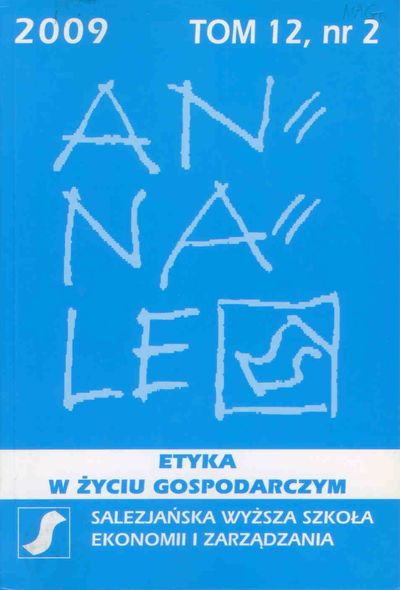Psycholog jako nauczyciel akademicki w mediach. Refleksja etyczna
DOI:
https://doi.org/10.18778/1899-2226.12.2.06Słowa kluczowe:
ethical values, subjectivity, dignity, autonomy, mediaAbstrakt
As members of academic societies and acting in accordance with a professional-ethical code, psychologists are required to realise principal ethical values connected with their profession, which include dignity, subjectivity and autonomy of a human being. Moreover, in relations with representatives of different fields of knowledge, psychologists attempt to promulgate such types of relations, based on the aforementioned values. The recent development of the media has provided many psychologists with a unique chance to popularise psychological knowledge. Nevertheless, while spreading it, every psychologist is obligated to check if the content of presented facts is in accordance with contemporary science, taking into consideration not only the differences between hypotheses, but also substantiated claims. Special attention is paid by every psychologist to a careful present a tion of the facts which are at variance with the common psychologi cal knowledge or are susceptible to various interpretations. Therefore, practical capabilities of the modern psychology are pr e sented by psychologists in an honest way. Psychologists disseminate knowledge through a variety of media. Their main focus is on writing sc i- entific and popular scientific articles, but sometimes also psychological articles for advice sections or ps y- chological columns of the daily press. What is more, the r a dio, the television and the Internet provide a great possibility of populari sing psychology. Neverth e less, it should be emphasized that there are a lot of dangers of moral nature, hidden behind almost unlimited possibilities offered by the above - mentioned inn o- vations. Hence, there appears a demand for an ethical refle c tion on the risks of the media involvementBibliografia
Adamczyk J., „Szkalujcie, szkalujcie i tak część się przyczepi” – manipulacja w polityce, „Biuletyn Edukacji Medialnej”, „Norbertinum” 2006, nr 1.
Google Scholar
Artymiak M., Etyczne aspekty badań w cyberprzestrzeni [w:] Dylematy etyczno-zawodowe psychologa, red. M.Z. Stepulak, TN KUL, Lublin 2002.
Google Scholar
Babin P., Media – Moute et Eglise [w:] red. J. Chrapek, Kościół a środki społecznego przekazu, Michalineum, Warszawa 1990.
Google Scholar
Dybalska R., D. Kępa-Figura, P. Nowak, Przemoc w języku mediów?, UMCS, Lublin 2004.
Google Scholar
Dyoniziak R., Sondaże a manipulowanie społeczeństwem, UJ, Kraków 1997.
Google Scholar
Gordon T., Wychowanie bez porażek, IW PAX, Warszawa 2001.
Google Scholar
Iłowiecki M., Media, władza, świadomość społeczna, Wyższa Szkoła Filmowa, Łódź 1999.
Google Scholar
Kalisz R., Pragmatyka językowa, GWP, Gdańsk 1993.
Google Scholar
Kępa-Figura D., Gry językowe w komunikacji radiowej [w:] Przemoc w języku mediów?, red. R. Dybalska, D. Kępa-Figura, P. Nowak, UMCS, Lublin 2004.
Google Scholar
Kodeks Etyczno-Zawodowy Psychologa, Polskie Towarzystwo Psychologiczne, Warszawa 1992.
Google Scholar
Lepa A., Świat manipulacji, Biblioteka Niedzieli, Częstochowa 1995.
Google Scholar
Lepa A., Świat propagandy, Biblioteka Niedzieli, Częstochowa 1994.
Google Scholar
Smoleń J., Media w duszpasterstwie. Z nauczania Magisterium Ecclesiae, „Biuletyn Edukacji Medialnej”, „Norbertinum” 2006, nr 1.
Google Scholar
Sobiechowska J., Konspekt lekcji o manipulacji w programach informacyjnych słowo – obraz, „Biuletyn Edukacji Medialnej”, „Norbertinum” 2006, nr 1.
Google Scholar
Stepulak M., Odpowiedzialność moralna psychologa w mediach, „Łódzkie Studia Teologiczne” 2008, w druku.
Google Scholar
Stepulak M., Psycholog jako zawód zaufania społecznego, TN KUL, Lublin 2007.
Google Scholar
Sujak E., ABC psychologii komunikacji, WAM, Kraków 2006.
Google Scholar
Zasępa T., Internet. Fenomen społeczeństwa informacyjnego, Wyd. Świętego Pawła, Częstochowa 2001.
Google Scholar
Pobrania
Opublikowane
Jak cytować
Numer
Dział
Licencja

Utwór dostępny jest na licencji Creative Commons Uznanie autorstwa – Użycie niekomercyjne – Bez utworów zależnych 4.0 Międzynarodowe.









